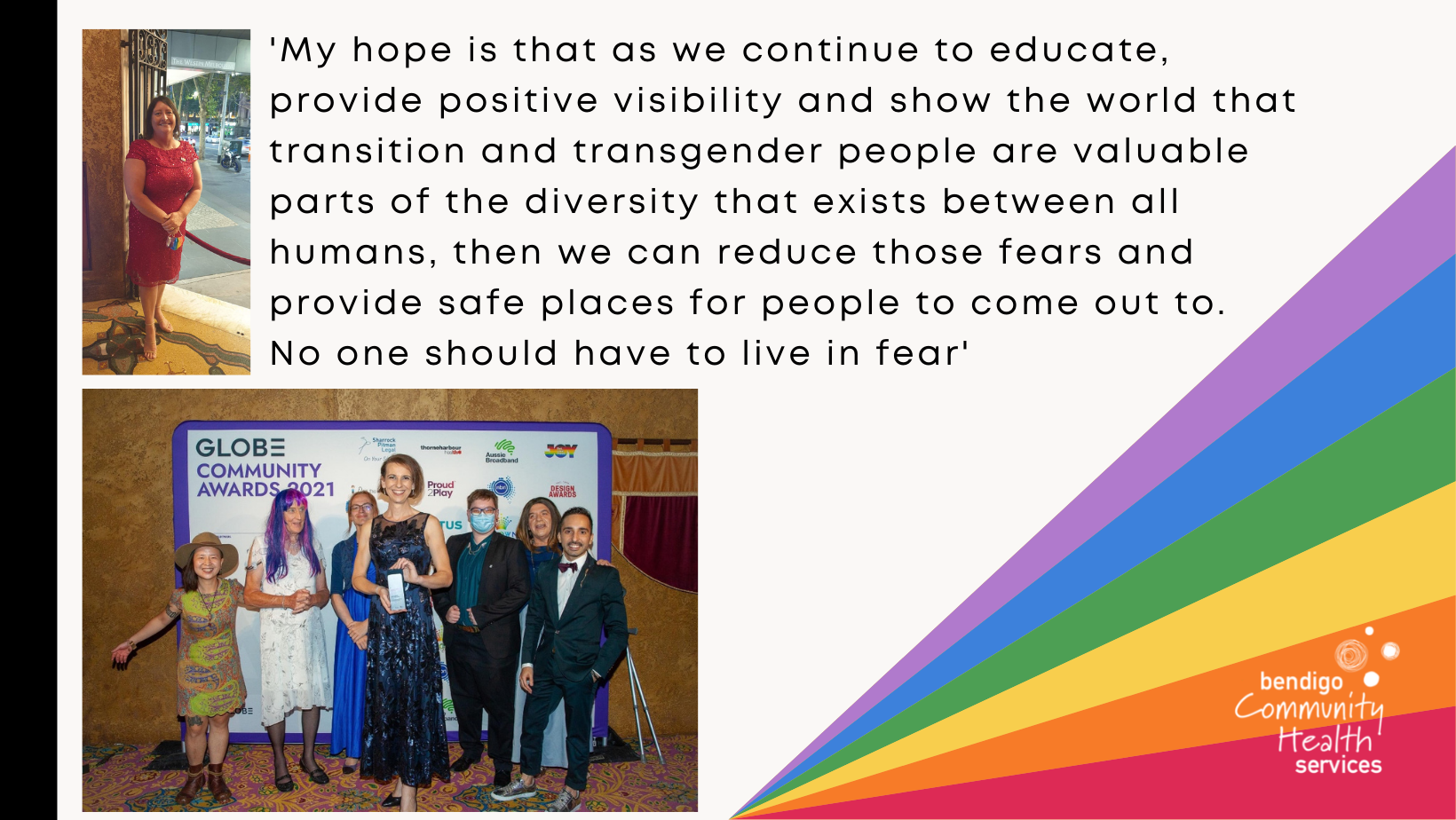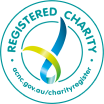“When trans people are ready to be out in public and start presenting themselves to the world as a gender that differs from that assigned at birth, it can be frightening, not knowing how people will respond,” she said.
“It can be challenging, having to explain to each and every person who questions the change in identity. It can be confronting having to change identification documents, email addresses and anything else with name and gender listed.
“There is a lot of fear surrounding coming out, some of it is real and some of it is perceived fear. Some trans people live with this fear and hide their true identity for many debilitating years.”
Zara says friends, families and workplaces have an important role to play in creating safe spaces for trans people to make their social transition.
Soon after coming out as transgender, Zara shared her story with her Bendigo Community Health Services colleagues through a workplace presentation, ‘So what if she is trans!’, – a decision she says gave her strength and empowered her to advocate within the broader community.
“My transition had already begun and people in the workplace were noticing small changes and differences. They seemed curious but not confrontational,” she said.
“My immediate colleagues and managers were already providing wonderful support and encouragement so, although somewhat anxious, I made the decision to come out to the organisation by means of sharing my story as part of trans awareness week.
“The attendance to the presentation I made was extremely encouraging. Questions were appropriate and conducive to learning. I felt safe, supported and encouraged by the responses of colleagues. The emails and acknowledgements I received following the presentation boosted my confidence and I was grateful to be invited to change my email signature, log in details and all the BCHS identity documents.”
Being invited to work on projects such as the anti-stigma campaign provided Zara with “the confidence that BCHS were allies and advocates in the work to create positive attitudes towards difference”.
“Change can be difficult, but when there are very few role models, transition information and community available to guide that change, it becomes so important for friends, family and colleagues to create a safe place to explore that change,” she said.
“There have been times when my transition has been exhausting. Constant misgendering, identity erasure and obvious looking me up and down with disgust were daily confrontations to my mental health.
“To balance the debilitating weight of negative attitudes and experiences, I soaked up the love, support and encouragement of all the positive people in my life. Friends, family, colleagues and even strangers who had positive words of affirmation outweighed the negative experiences and gave me the strength to respond to negativity with measured grace and gentle education which has been instrumental in changing attitudes.”
Changing attitudes means helping others learn to celebrate and appreciate each other’s differences, Zara says – because even within our own tribes, there is diversity.
“I have lived 40 years perceived as male and now I am experiencing life as a female. I am experiencing the gendered expectations, presumptions and prejudice from two ends of the spectrum. It is important to find your tribe to feel connected and see others like you, but even within the tribe, there are a diverse range of humans,” she said.
“I have some overlapping experiences with other trans women, but I am not like all trans women. I also have similar experiences to cis women, but I am not like all cis women. Every person within a group of people, is still a person. An individual with their own life experiences, behaviours, skills and dreams.
“Judgements, prejudice and gender stereotypes are all minimising actions that keep us from expressing our individual selves. When we learn to celebrate and appreciate our differences, we are all given space to thrive.”
Being an ally
Maree Dixon works with LGBTIQA+ young people and their families, and says ‘we need to be a more accepting world and accept people for who they are, free of judgement and ridicule’.
“We live in a very diverse time, we are all unique in our own way so we should all be able to live as our authentic selves without being judged. Sometimes people fear what they don’t understand, I feel if everyone took the time to learn, met and spoke to people in the community and learnt about their experiences the world would be more positive for the LGBTIQA+ community,” she said.
“This affected me personally with my daughter, wondering how I can help make her world a safe and more accepting place. As the HEY Diversity Worker at headspace Bendigo, I work with LGBTIQA+ young people and their families, I understand their struggles and challenges that they face daily and this needs to change.
“We know the mental health issues these young people face due to discrimination, internalised/external transphobia, homophobia and biphobia, the high rates of death by suicide. It’s up to us as a society to create a more safe and inclusive place so our young people can thrive and be accepted to have a positive and fulfilling life.”
Maree says being a good ally means listening without judgement, advocating for the community, promoting awareness through educating the wider community, being supportive of LGBTIQA+ rights and defending them against discrimination.
She says allies offer a strong and supportive voice, and know to speak with the community and not over them.
“For me it’s also spending/volunteering time at events, getting to know your local LGBTIQA+ community. I have met some wonderful people, made many new friends who I actually see as family,” she said.
Our BCHS GLOBE stars
Zara and Maree were both recently acknowledged at the annual GLOBE awards, which recognise and celebrate achievement in Victoria’s LGBTIQA+ community.
Zara received the award for Transgender Inclusion on behalf of Trans and Gender Diverse Bendigo and Beyond, and was an LGBTIQ Regional and Rural Champion finalist.
Maree was recognised as a finalist in the LGBTIQ Ally of the Year.
Zara says the awards “shine a light on the work being done around the state and allow community members, some of which are isolated and feeling like the world is against them, to see there are people out there passionate about their wellbeing and striving to create a safe place for them to thrive”.
“In 2019, I attended the awards as a fresh new trans person finding my way in the community. I had just started an online group called TGD Bendigo, to try and meet other trans and gender diverse people in my area,” she said.
“As I walked into the Globe Awards I was overwhelmed by the energy and passion of the attendees. I felt very small and insignificant in comparison to those in the room achieving so much for the community. As I heard the stories of the finalists and watched the award recipients take the stage, I was filled with encouragement, strength and passion to be visible and proud of the person that was hidden away from the world. I became an empowered activist, determined to change attitudes.
“To stand on that stage and receive the award for Transgender Inclusion on behalf of Trans and Gender Diverse Bendigo and Beyond, two years after attending the Globe awards, shows the incredible power to thrive, that exists in each of us, when we are encouraged, supported and nurtured to grow. I can only hope that somewhere in the audience, was a human with great potential, who’s passion has been ignited as mine was two years ago.”
Maree says the GLOBE awards are important to acknowledge the hard and challenging work being done in the community by people such as Zara.
“They are a celebration for the community to come together and celebrate. Additionally, the GLOBE awards show the LGBTIQA+ community that their need for support is recognised and prioritised by so many others evident in the time and resource that are put towards these initiatives.”
Bendigo Pride Festival will be held from March 18 – April 3. For information visit: bendigopridefestival.com.au







